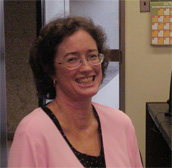Mary E. McNaughton-Cassill, Ph.D., Individual Investigator |

Mary McNaughton-Cassill completed her Ph.D. in 1991 at the University of California, San Diego-San Diego State University Joint Doctoral Program in Clinical Psychology with an emphasis on Behavioral Medicine. Her research involved psychological and psychoimmunological explorations of stress responses among elderly Alzheimer’s Disease caregivers. She also holds a Master’s Degree in Psychology from the University of California, Santa Barbara with an emphasis on Physiological Psychology, which involved the study of glucocorticoid responses to stress in rats. She is currently an Associate Professor of Psychology and Associate Dean of Undergraduate Affairs and Learning Support.
Dr. McNaughton-Cassill began teaching Psychology in 1984 as a Community College Instructor and an Adjunct Professor. She currently teaches Theories of Learning, Psychology and Health, Abnormal Psychology and Stress Management, Physiological Psychology, and team-teaches an Honors’ Seminar on the Science and Psychology of Everyday Life. She also works with undergraduate and graduate students as a research mentor, and is the advisor for the Student Psychological Association and the Mortar Board Honor’s Society. She was the 2004 recipient of the Chancellor's Council Outstanding Teaching Award.
She has worked as a Clinical Psychologist with college student populations, with an outpatient schizophrenia program, on a spinal cord injury unit, and with nursing home populations. She has also led stress management groups and conducted research on stress during couples' experiences when undergoing in-vitro fertilization treatment for infertility.
Dr. McNaughton-Cassill's current research interests include the impact of stress and coping on physical and psychological well-being, specifically the evaluation of the interaction of stress including the news media and the technological characteristics of modern life with cognitive and personality factors that impact mental and physical health. She is also looking at the psychological impact of high stakes standardized testing on elementary school children and their families. She has received research funding from the Minority Biomedical Support program through NIH and at UTSA. |
|
McNaughton-Cassill, M. E., & Smith, T. (in press). My world is OK, but yours is not: Television news, the optimism gap, and stress. Journal of Stress Medicine.
Pillow, D.R. & McNaughton-Cassill, M. E. (in press). Media exposure, perceived similarity, and counterfactual regret: Why did the public grieve when princess Diana died? The Journal of Applied Social Psychology.
McNaughton-Cassil, M. E. (2001) The news media and psychological distress. Anxiety, Stress and Coping, 14, 193-211.
McNaugton-Cassil, M .E., Bostwick J. M., Vanscoy, S. E., Arthur, N. J., Hickman, T. N., Robinson & Neal, G. S. (2000). Development of brief stress management support groups for couples undergoing in vitro fertilization treatment. Fertility and Sterility 74, 1, 87-93.
|
